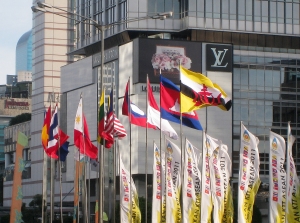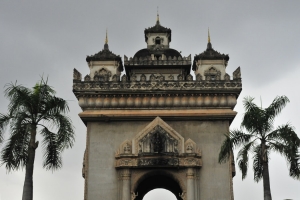Asia Banking Research
Demand for cross-border remittances is surging across Southeast Asia, home to a sizeable migrant worker population and many of the world's fastest growing economies. The amounts being remitted by the region's 21 million migrant workers are considerable - $68 billion annually, according to Siam Commercial Bank (SCB). Given their modest earnings, migrant workers need affordable banking services. They cannot easily absorb the high fees associated with some traditional remittance services.
Will Laos's new AML policies be effective?
Two years ago, Laos was removed from the Financial Action Task Force's (FATF) money-laundering grey list after the landlocked Southeast Asia country showed some improvement in its AML policies. Since then, however, progress has been limited. Laos's casinos, property market and money exchange shops remain at high risk for money laundering. No money laundering case has made it to court. The onus is on Laos to better control financial impropriety ahead of a 2020 evaluation of its AML policies. Failure to do so could result in a return to the grey list.
Not even the failure to obtain a virtual-banking license can dampen investor interest in South Korea's fintech unicorn Viva Republica and its digital banking platform Toss. In mid-August, Viva Republica announced it had raised $64 million from a group of investors led by Hong Kong-based Aspex Management. The latest capital injection brings Viva Repubica's total valuation to US$2.2 billion and follows an $80 million funding round in December co-led by Korean investors, Kleiner Perkins and Ribbit Capital.
Myanmar is at risk of landing on the Financial Action Task Force's watchlist high-risk money-laundering destinations after a three-year reprieve, analysts say. In 2016, FATF removed Myanmar from the list, citing improvements in the country's efforts to combat financial crime. Since then, however, Myanamar has not taken adequate steps to implement safeguards against money laundering in both its banking system and non-financial institutions. If Myanmar appears on FATF's "grey list" again, investors could sour on the Southeast Asian nation's financial sector, which would harm fintech development as well as broader financial inclusion initiatives.
Rakuten bets on digital banking in Taiwan
In July, Taiwan's Financial Supervisory Commission (FSC) granted three virtual-banking licenses, surprising some observers who expected the regulator would only issue two. All three teams that applied for the licenses - led respectively by Japanese super app Line, Taiwanese telecoms firm Chunghwa Telecom and Japanese e-commerce giant Rakuten - were well qualified, such that the FSC felt they all deserved to launch neobanks in Taiwan.
How did Kakao become Korea's first profitable virtual bank?
South Korea's financial regulators have taken a conservative approach to digital banking, issuing a limited number of licenses and outright rejecting a number of recent applicants. One of the only two firms to win a digital banking license thus far is Kakao Bank, a subsidiary of the Korean super app KakaoTalk. With its massive user base - which counts 94% of South Korea's population of 50 million as users - Kakao is poised to stake out a dominant position in the nascent South Korean digital banking market.
Will money laundering hinder Cambodia's development?
Cambodia is struggling to contain a mounting money laundering problem. In July, authorities seized $7.4 million in cash and detained nine people at Phnom Penh and Siem Reap airports as part of anti-money laundering (AML) efforts. Cambodian authorities have stepped up AML activity since February when the Financial Action Task Force (FATF), an international money-laundering watchdog, placed Cambodia on its gray list after it found "significant deficiencies" in the kingdom's AML ability.
Cambodia had previously been on FATF's gray list but was removed in 2015 after making some improvements to its AML policies. FATF put Cambodia on the gray list once again in February after the organization concluded the kingdom had never prosecuted a money-laundering case. FATF also found that Cambodia had done little to investigate cases of money laundering and terrorist financing, while the watchdog described the Cambodian judicial system as having "high levels of corruption."
Australian challenger banks aim to shake up status quo
In early August, Australian challenger bank Judo announced it had completed a second round of equity fundraising that brought in a record $400 million, double the original target of $200 million. In this new round of fundraising, the largest ever for an Australian startup, Bain Capital Credit and Tikehau Capital joined existing shareholders OPTrust, the Abu Dhabi Capital Group, Ironbridge and SPF Investment Management.
Is Macau doing enough to combat money laundering?
The Chinese gambling hub of Macau has a well deserved reputation for illicit activity. Although the territory has prospered in the two decades since returning to Chinese rule, overtaking Las Vegas to become the top gaming destination globally, the sources of its riches have sometimes been questionable. Corrupt officals and businessmen as well as criminal organizations launder money through the territory, taking advantage of its lax regulatory environment. Macau has no currency or exchange controls, while its threshold for reporting transactions in casinos is more than US$62,000, compared to an international standard of US$3,000.
Go-Jek attracts big investment from traditional financial industry firms in latest funding round
For Indonesian ride-hailing giant Go-Jek, the more funding rounds the merrier. As it seeks to gain a leg up on its arch-rival Grab, Go-Jek is tapping a wide variety of investors bullish on the Indonesian decacorn's digital banking prospects. In its latest funding round, the second half of Series F, Go-Jek attracted an estimated $3 billion (the company has not disclosed the actual figure) from investors including top Thai lender Siam Commercial Bank, Visa and three Mitsubishi firms: Mitsubishi Motors, Mitsubishi Corp. and Mitsubishi UFJ Lease & Finance.
More...
In the emerging world of super apps, Japan's Line is something of an anomaly. It is neither a wholly domestic phenomenon like China's WeChat nor global like the U.S.'s WhatsApp. It is not a ride-hailing app like Singapore's Grab or Indonesia's Go-Jek. Rather, Line is a quirky messaging app beloved in its home market of Japan as well as in Taiwan and Thailand, where Japanese culture has enduring appeal, and to a lesser extent in Indonesia. Outside of those markets, it is virtually unknown.
WeChat has proven that a messaging app can become a digital wallet and that the road to monetization runs through fintech. Line aims to show that such a platform is viable regionally in Asia. Because Japan remains attached to cash, Line cannot rely on its home market alone. “Fintech itself is a proven monetized model, the only problem is how fast we can secure a meaningful size of users,” Line co-CEO Shin Jung-ho told Bloomberg in a June interview.
Virtual banks are coming to Singapore, but the biggest incumbents have little to fear. Singapore's top three lenders, DBS, UOB and OCBC, have plenty of cash to invest in fintech innovation. What they cannot build independently they can access through tie-ups with startups. For smaller lenders who lack the heavyweights' resources, the virtual banks could pose a tougher challenge. The scope of the challenge will depend on how much freedom the Monetary Authority of Singapore (MAS) gives the new entrants.
Taiwan has a fairly well developed financial industry. This small island has a population of only 24 million in total, but has access to more than 5,000 physical financial institutions. Customers, therefore, are able to enjoy all the banking services provided with ease. Plus, the interest rates on loans in Taiwan are extremely low with only 2.63% APR. The application for a fiduciary loan becomes relatively easy for office workers. Thus, FinTech derivatives such as P2P lending are not previously widely considered.
Can WeLab's virtual bank succeed in Hong Kong?
In April, the Hong Kong-based fintech startup WeLab quietly won the former British colony's fourth virtual-banking license. Founded in 2013 by ex-Citibank executive Simon Loong and two other partners, the company has steadily grown over the last six years. It now has 30 million customers in Hong Kong and mainland China as well as a staff 600 strong. The company expects to launch its virtual bank - named WeLab Digital - between October and January.













